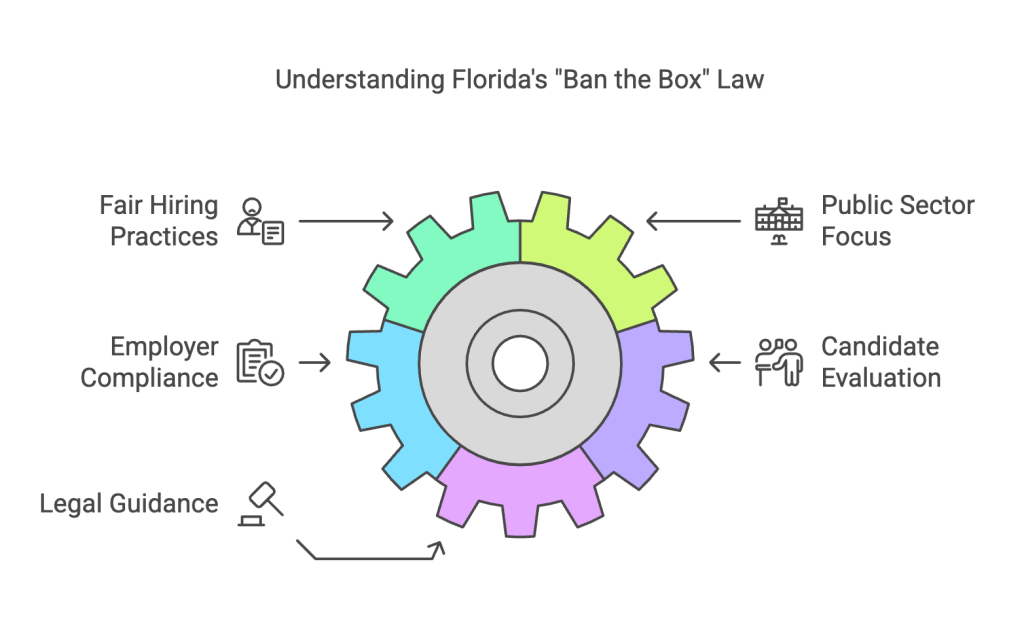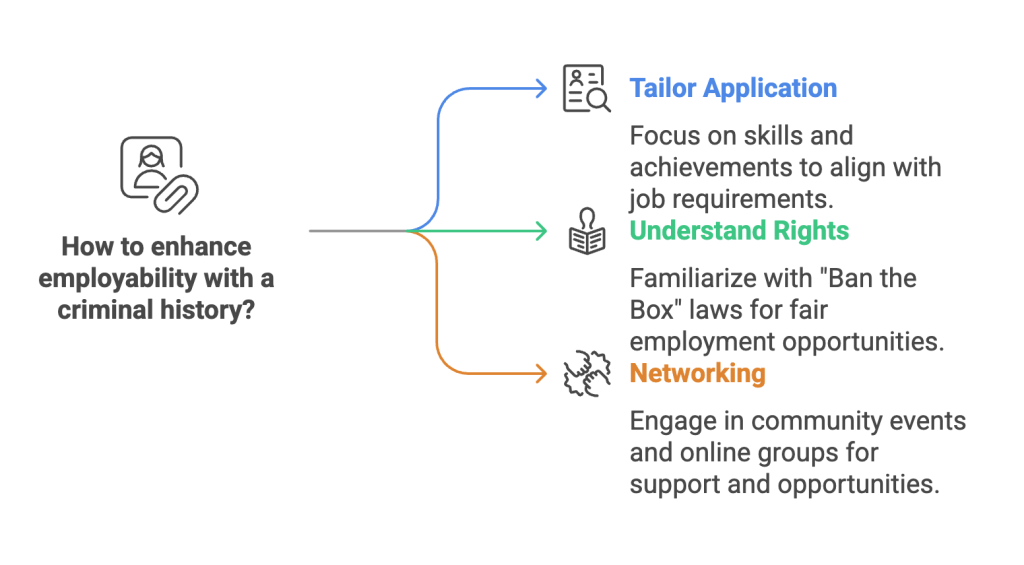In recent years, the "Ban the Box" movement has gained significant momentum across the United States, including Florida. This initiative seeks to remove the checkbox on job applications that asks whether applicants have a criminal history, allowing individuals with past convictions a fairer chance in employment processes. As of 2025, Florida's approach to "Ban the Box" reflects a commitment to more inclusive and equitable hiring practices. This article provides an in-depth exploration of what job seekers need to know about "Ban the Box" in Florida, addressing its legal, social, and technological dimensions.
Key Takeaways
- Florida's "Ban the Box" law helps ensure job applicants are judged on their qualifications first, delaying questions about criminal history.
- By removing the checkbox for criminal history on job applications, Florida aims to create a more inclusive job market, particularly in the public sector.
- Technological advancements streamline background checks but should comply with "Ban the Box" requirements to ensure fair hiring practices.
- Success stories from Florida companies show that "Ban the Box" can increase workforce diversity and keep retention rates high, proving economic benefits.
- As a job seeker, knowing your rights under "Ban the Box" in Florida empowers you to pursue employment opportunities fairly and securely.
Introduction
The "Ban the Box" movement started as a grassroots effort. Its primary aim is to remove the checkbox that asks about criminal history on job applications. This initiative promotes fair chances for those with past convictions.
Florida embraced this movement, reflecting a shift toward inclusive hiring practices. The state's actions have implications for how job seekers approach the application process. Removing early-stage discrimination offers opportunities based on merit rather than background.
This article aims to provide you with the knowledge necessary to navigate this landscape effectively. Understanding these changes can help you to highlight your skills and secure employment. This guide will break down legal, social, and technological dimensions, preparing you for the hiring process in Florida.
The Legal Framework of "Ban the Box" in Florida

Florida's "Ban the Box" law is designed to promote fair hiring practices by delaying questions about criminal history until later in the hiring process. As of 2025, this law applies mainly to public sector jobs in the state.
State regulations prevent government employers from including the checkbox for criminal history on initial job applications. This gives candidates the chance to be considered based on their qualifications before their criminal history comes into play. These practices align with the principles outlined by the Florida Fair Employment Practices Act, which promotes non-discriminatory hiring processes.
In the public sector, Florida's regulations are making strides toward equitable hiring by ensuring that job seekers aren't prematurely eliminated due to past convictions. Employers in this sector can't ask about criminal records until later stages, typically during interviews or after conditional job offers are made.
For employers looking to comply, transparency and consistency are crucial. They should develop clear policies that outline when and how they will inquire into a candidate's criminal history. Training hiring managers to follow these guidelines consistently is key. Documentation is also importantâkeeping records of hiring decisions can help mitigate the risk of lawsuits.
Employers can be proactive by staying informed about relevant legal updates. Joining industry associations or consulting with legal experts specializing in employment law can provide ongoing guidance.
Does your hiring process hold up to these standards? It's worth reviewing your current procedures to ensure alignment with Florida's "Ban the Box" regulations. Your adherence not only supports fair hiringâit may broaden your pool of candidates, leading to a more diverse and capable workforce.
Social Implications of "Ban the Box"
"Ban the Box" transforms how society views individuals with criminal records. The initiative shifts focus from past mistakes to future potential. In Florida, this opens doors to second-chance hiring, lifting barriers for many seeking stable employment.
Studies show that "Ban the Box" laws can improve job prospects for those re-entering society. For instance, a study in Durham, North Carolina, after implementing the policy, showed a 7% increase in hiring for applicants with criminal records. Although data specific to Florida is evolving, similar trends are expected.
Inclusive hiring policies benefit communities by reducing recidivism. When people secure jobs, they are less likely to reoffend. This creates safer neighborhoods and eases burdens on the criminal justice system.
Your rights as a job seeker in Florida are protected under "Ban the Box" legislation. If you suspect discrimination due to a criminal history, the policy supports legal recourse. Stay informed about your rights and report violations to the appropriate state authority.
"Ban the Box" isn't just a legal shiftâit's a social one, aiming for a more inclusive workforce. Understanding its implications helps you better navigate job opportunities, emphasizing abilities over history.
Technological Dimensions and Background Check Reforms
Technology plays a pivotal role in shaping modern background checks. With digital advancements, background checks have become faster and more efficient. This is a critical development for maintaining fair hiring practices under the "Ban the Box" initiative.
Background checks now rely heavily on automation and databases, which speed up the process considerably. For instance, automated reports can pull criminal records, credit history, and employment verification in minutes. This efficiency allows employers to conduct thorough checks while still supporting fair consideration for all candidates.
In Florida, recent reforms aim to strike a balance between transparency and fairness. The use of technology must be compliant with the principles of "Ban the Box", meaning employers cannot unfairly dismiss a candidate based on early criminal record screenings. Instead, they must wait until later stages in the hiring process.
Technology also aids in compliance. Tools and platforms have emerged that help employers navigate the nuances of state laws. These tools ensure that employers are not only conducting background checks legally but also ethically. Partnering with the right tech providers can prevent costly legal missteps and align operations with "Ban the Box" requirements.
The Professional Background Screening Association offers guidance on best practices for integrating technology in background screenings. They emphasize that understanding technological capabilities and limitations is crucial for sustainable compliance.
As you consider applying for jobs in Florida, understand that while tech-driven background checks are fast and thorough, they should not hinder your opportunity. It's essential for both job candidates and employers to harness these tools responsibly, ensuring a fair chance for everyone.
Case Studies and Data-Driven Insights
Success stories from Florida companies highlight the real impact of "Ban the Box" on hiring practices. Take the example of a local tech company in Miami. After implementing "Ban the Box" in 2023, they reported a 20% increase in their candidate pool diversity and a 15% increase in retention rates over two years. Removing the criminal history checkbox allowed them to focus on skills and potential, benefiting both the company and the employees.
Data supports these success stories. A 2024 study by the University of Florida found that companies adopting "Ban the Box" measures saw a 10% increase in the hiring of individuals with prior convictions. The study also noted a correlation between these hiring practices and reduced turnover, showcasing economic benefits for employers.
Despite positive outcomes, "Ban the Box" has faced criticism. Critics argue that removing the checkbox is not enough to eliminate hiring bias. A study by the Brookings Institution in 2025 indicated that some employers might still use background checks at later stages, which could perpetuate discrimination. This highlights the need for a multi-faceted approach in conjunction with "Ban the Box" to truly promote fair hiring.
How can we ensure these initiatives continue to be effective? Engaging all stakeholdersâemployers, policymakers, and communitiesâis crucial. Are companies prepared to integrate training programs that reduce unconscious bias? These questions underline the complex landscape of inclusive hiring, urging further dialogue and refinement.
Actionable Takeaways for Job Seekers

Preparing Your Application
If you have a criminal history, presenting yourself effectively is crucial. Focus on your skills and experiences. Highlight your achievements and how they align with the job requirements. Tailor your resume to emphasize these points. Be honest if asked about your past but steer the conversation toward how you've grown. Consider using a functional resume format to highlight your skills instead of chronological employment gaps.
Understand Your Rights
Knowing your rights is an empowering step. Familiarize yourself with "Ban the Box" laws in Florida. These laws are designed to give you a fair shot at employment. If you feel discriminated against because of your past, you have options. You can contact organizations that offer legal help in employment issues. Being informed puts you in a stronger position when advocating for yourself in the hiring process.
Networking and Resources
Networking can open doors that online applications cannot. Attend local job fairs and community events where you can meet employers face-to-face. Reach out to local non-profits or community organizations focused on second-chance employment. They often have resources and connections with employers who value inclusive hiring. Consider joining online communities or groups that support job seekers with criminal histories. Sharing experiences and advice with peers can be invaluable.
Conclusion
In 2025, "Ban the Box" in Florida represents a shift toward fairer hiring practices. The initiative's goal is to provide individuals with criminal histories a fair chance when seeking employment. While progress has been made, there's still a need for continued advocacy.
Job seekers need to stay informed and proactive. Learn your rights, and be ready to speak up if treated unfairly. Employers should aim for transparency and equity in their hiring processes.
For job seekers facing challenges, knowing how "Ban the Box" affects you is crucial. Use your knowledge to build a stronger application and network effectively.
The future of fair hiring in Florida depends on collective effort and vigilance. With the right strategies, job seekers can confidently navigate the job market and find success.
Frequently Asked Questions (FAQs)
Does Ban the Box apply to all employers in Florida?
No, Ban the Box is only mandatory for public employers in Florida. Private employers are not legally required to adhere to this rule.
Can Florida employers ask about criminal history during interviews?
Yes, employers in Florida can inquire about your criminal history during interviews. The Ban the Box law prevents this question on initial applications, not during interviews.
How does Ban the Box affect job seekers with criminal records in Florida?
It provides an opportunity for job seekers with criminal records to be judged on their skills and qualifications before their criminal history is considered.
Are private employers required to follow Ban the Box laws in Florida?
No, private employers are not mandated by law to follow Ban the Box requirements, though many choose to implement similar policies voluntarily.
What are the penalties for non-compliance with Ban the Box in Florida?
Specific penalties are not clearly defined, but non-compliance by public employers can lead to legal challenges and potential lawsuits.
Which companies in Florida have adopted Ban the Box policies?
Companies like Walmart, Target, and Home Depot have voluntarily adopted Ban the Box policies, reflecting a wider trend among large corporations.
What can job seekers do if their criminal history is unfairly judged?
If an employer unfairly judges you based on your criminal past, consider discussing it with the employer directly or seeking legal advice if necessary.
Can employers perform background checks even if they donât ask about criminal history?
Yes, employers can conduct background checks at any stage of the hiring process, ensuring they comply with any relevant laws on notification and authorization.
Do Ban the Box laws guarantee employment for individuals with criminal records?
No, these laws do not guarantee employment but aim to ensure a fair evaluation of your qualifications and skills first.
How can someone improve their job search with a criminal record in Florida?
Highlight skills and experiences that make you an asset. Consider industries more open to hiring individuals with criminal records, such as construction or hospitality.
Definitions
- Ban the Box - A movement aimed at eliminating the checkbox on initial job applications that asks about an applicant's criminal history. It delays inquiries into a candidate's background until later in the hiring process, ensuring decisions are initially based on qualifications rather than past convictions.
- Fair Employment Practices - Rules and guidelines designed to promote non-discriminatory hiring processes, ensuring all candidates are treated equitably regardless of factors like criminal history, race, gender, or disability. These practices encourage inclusivity and help reduce unconscious bias during recruitment.
- Second-Chance Hiring - An approach to recruitment that intentionally provides job opportunities to individuals with a criminal record, focusing on their future potential rather than their past mistakes. It aims to reduce barriers to employment, supporting community reintegration and lowering recidivism rates.
- Background Checks - The process of verifying a candidate's personal, educational, and criminal history as part of hiring. Modern systems often rely on technology to quickly pull reports, but "Ban the Box" regulations ensure these are typically conducted later in the recruitment timeline.
- Criminal Record Transparency - The principle of balancing fairness with the need for honesty in hiring. Employers under "Ban the Box" are encouraged to inquire responsibly about criminal history after evaluating a candidateâs qualifications, ensuring decisions are transparent and ethical.

GCheck Editorial Team
Meet the GCheck Editorial Team, your trusted source for insightful and up-to-date information in the world of employment background checks. Committed to delivering the latest trends, best practices, and industry insights, our team is dedicated to keeping you informed.
With a passion for ensuring accuracy, compliance, and efficiency in background screening, we are your go-to experts in the field. Stay tuned for our comprehensive articles, guides, and analysis, designed to empower businesses and individuals with the knowledge they need to make informed decisions.
At GCheck, we're here to guide you through the complexities of background checks, every step of the way.





